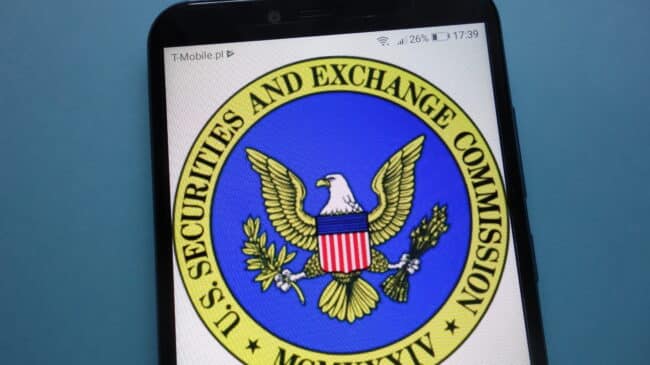Thomas Joseph Powell, Barry D. Romeril, Christopher A. Novinger, Raymond J. Lucia, Marguerite Cassandra Toroian, Gary Pryor, Joseph Collins, Rex Scates, Michelle Silverstein, Reason Foundation, Cape Gazette, Ltd., and the New Civil Liberties Alliance, Petitioners,
v.
United States Securities And Exchange Commission, Respondent.
On Petition for Review from the
United States Securities and Exchange Commission No. 4-733
This petition seeks review of the U.S. Securities and Exchange Commission’s denial of a petition to amend its requirement that settlement of all cases must include a lifetime prior restraint on speech. That restraint bars the settling enforcement target from ever even “indirectly” leaving the “impression” that “any allegation in [SEC’s] complaint” is “without factual basis.” No act of Congress authorizes such a sweeping restriction on freedom of speech and of the press as a condition of settling a government case. Nor could it.
The First Amendment of the Constitution provides that “Congress shall make no law…abridging the freedom of speech, or of the press; or the right of the people…to petition the Government for a redress of grievances.”
This Circuit has concluded with clarity that courts lack power to enforce unconstitutional prior restraints and content- and viewpoint- based speech restrictions as conditions on settlements—even when entered on consent. Davies v. Grossmont Union High Sch. Dist., 930 F. 2d 1390, 1399 (9th Cir. 1991) cert. denied, 501 U.S. 1252 (1991) (invalidating the portion of a settlement agreement in which a party waived his right to run for public office); United States v. Richards, 385 F. App’x 691, 693 (9th Cir. 2010) (invalidating term of plea agreement forbidding defendant from making public comments about county commissioner). These law-of-the-Circuit precedents are buttressed by the Fourth and Sixth Circuits. Overbey v. Mayor of Balt., 930 F.3d 215, 219 (4th Cir. 2019); G&V Lounge, Inc., v. Michigan Liquor Control Comm’n, 23 F.3d 1071, 1077 (6th Cir. 1994).
The SEC-imposed gag is a quintessential prior restraint—“the most serious and the least tolerable infringement on First Amendment rights.” Neb. Press Ass’n v. Stuart, 427 U.S. 539, 559 (1976). The notion that a governmental body may wield its power to decide who is to be permitted to comment on the agency’s own behavior undermines the core purpose of the First Amendment.
The gag rule also violates the due process of law by requiring defendants to waive their constitutional rights if they settle with the agency, including rights to be heard on the terms of the settlement, rights to notice of what speech would violate the gag, and the right to freely exchange their views of the administrative process they endured. The gag violates due process because it shields and encourages SEC regulation by settlement, allowing SEC to pursue cases not well-founded in established law or rules while forever silencing the targets of those actions.
The question raised in this appeal has exerted enormous individual, collective, and decades-long impact on Americans’ civil liberties and transparency in SEC’s regulation, which settles 98% of its cases. The stakes are high. If the denial order is not vacated, this Circuit will be disregarding its own precedents and complicit in hiding nearly all SEC agency enforcement practices from public scrutiny—in perpetuity.
SEC’s denial of the rulemaking petition perpetuates SEC’s 50-year unconstitutional reign of error. “Acquiescence for no length of time can legalize a clear usurpation of power…frequently yielded to merely because it is claimed.” Thomas Cooley, A Treatise on the Constitutional Limitations, 71 (1st ed. 1868).
“The construction given to the laws, by…the executive government, is necessarily ex parte, without the benefit of an opposing argument…[but] the judicial department…is not at liberty to surrender or waive [constitutional rights].” United States v. Dickson, 40 U.S. 141, 161–62 (1841) (Story, J.).
The same principle applies to judicial review under the APA.
Judulang v. Holder, 565 U.S. 42, 61 (2011) (holding that the “vintage” of agency actions is irrelevant and “longstanding capriciousness receives no special exemption from the APA”); see also Fisher v. United States, 425 U.S. 391, 407 (1976) (noting that “illegitimate and unconstitutional practices get their first footing … by silent approaches and slight deviations from legal modes of procedure” which can only be obviated by adherence to the Constitution) (citation omitted).
The founders, who enshrined the right of free speech, a free press, and rights of petition in the First Amendment, would never in their wildest imaginations have envisioned that a mere government agency could silence speech, dictate the content of speech, and compel corrective speech by those who would criticize that agency’s actions.
Congress itself could not enact a law extracting silence as a condition of settlement with the government; a mere administrative agency perforce lacks any such authority.
The Supreme Court recently unanimously recognized in Axon Enter., Inc. v. FTC and Cochran v. SEC, 598 U.S. 175 (2023) (“Axon/Cochran”), that SEC lacks the competence and expertise to decide constitutional questions. Accordingly, the SEC’s self-serving denial of the petition carries no credence in this Court, which is bound by the precedents set forth above. Justice Sotomayor wrote for a unanimous Court in NRA v. Vullo that no government official can “use the power of the State to punish or suppress disfavored expression” and that such “viewpoint discrimination is uniquely harmful to a free and democratic society.” 144 S. Ct. 1316, 1326 (2024).
This Court should vacate SEC’s denial and order rulemaking consistent with the Constitution and the opinion of the Court.
Full Brief: Powell v. SEC
